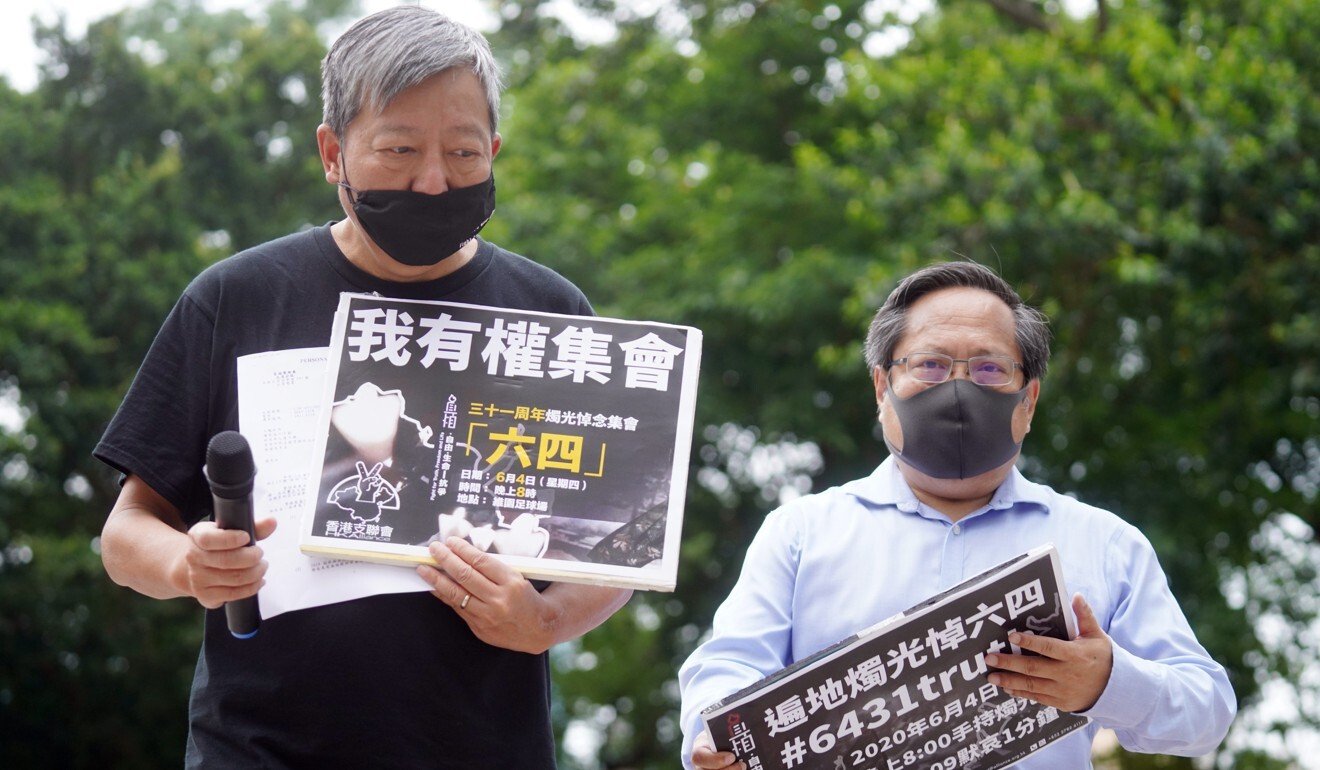
National security law: Hong Kong group behind June 4 Tiananmen vigil passes resolution to disband
- Leaders of the Hong Kong Alliance in Support of Patriotic Democratic Movements of China had earlier decided on the move
- Group is the latest among city’s opposition bodies to fold since security legislation came into force last year
The disbandment motion was voted through by a 41-4 majority at a special meeting of member groups of the Hong Kong Alliance in Support of Patriotic Democratic Movements at its June 4 museum. Beijing’s top office overseeing Hong Kong affairs described the decision as the “inevitable destiny” for anti-China troublemakers.
After the meeting ended, the group’s secretary Richard Tsoi Yiu-cheong said: “Our standing committee immediately ceased operations. There won’t be stances issued or activities organised in the name of the alliance.”
He said two liquidators appointed at the meeting would start winding-up procedures as the number of votes in favour of dissolution was more than the required three-quarters threshold.

Citing a letter from jailed alliance chairman Lee Cheuk-yan, Tsoi said: “All regimes cannot take away people’s memory and conscience … Hope is still here as there is still tinder. Our people will take the baton to vindicate June 4 and fight for democracy.”
Tsoi also apologised to the families of those who lost their lives in the June 4 crackdown in Beijing for not being able to organise annual vigils. Before the vote, members paid tribute to the victims.
Police, accusing the group of acting as a “foreign agent”, an offence under the national security law, sent letters to 12 people in the alliance in late August demanding information about its member list, financial reports and activities – a request the group refused to comply with.
Asked about the response to police operations against the 32-year-old alliance, Tsoi said members of the public would monitor whether the force’s actions were legal and constitutional.
In a statement on Saturday evening, the State Council’s Hong Kong and Macau Affairs Office (HKMAO) weighed in, calling the disbandment inevitable destiny and expressing its firm support for the local authorities’ investigations into its alleged offences.
A spokesman also singled out alliance vice-chairwoman Chow Hang-tung for “talking a lot of nonsense” until the last moment.
“Such an arrogant anti-China organisation and anti-China troublemakers in Hong Kong must be severely punished in accordance with the law,” he said.

Earlier in the day, Secretary for Security Chris Tang Ping-keung told a radio programme the authorities would continue to investigate the alliance even after it folded.
“If individuals and organisations breached Hong Kong laws, they cannot evade their criminal responsibilities just because of disbandment,” he said, adding that the authorities might also investigate alliance member groups if they were found to be receiving funds from foreign political groups to “conduct certain acts for their interests”.
The Confederation of Trade Unions has also started the process to dissolve amid warnings from authorities and attacks from pro-Beijing media over alleged national security violations.
Earlier this month, three alliance leaders – Lee, vice-chairman Albert Ho Chun-yan and Chow – and the group itself were charged with inciting subversion against state power.

Core member of June 4 vigil group urges members to resist calls to disband
The alliance’s top leadership had held divergent views on its future.
Writing from behind bars, Lee and Ho – who later resigned from the group – last Monday urged members to support disbandment, saying it was the “best solution” in light of the current social environment.
But Chow subsequently argued otherwise, saying the move would cause the group to lose its voice irreversibly. She also questioned in an open letter whether the June 4 museum, which police raided and shut down for two weeks, was a safe place to hold Saturday’s meeting, with rumours that pinhole cameras and listening devices had been installed on the premises.
2 leaders of Tiananmen vigil organiser urge members to vote to disband
Tsoi, who is responsible for logistics, said on Friday the venue had already been checked and cleaned, adding he hoped member groups would not be worried about “groundless” allegations.
The Security Bureau earlier started the process of revoking the alliance’s company registration, citing alleged violations of the Beijing-imposed security law.
Once called “subversive” by Beijing, the alliance has operated in Hong Kong since May 1989. Among its five goals were “ending one-party dictatorship” in mainland China, “building a democratic China” and “demanding accountability for the June 4 crackdown”.
Hong Kong authorities had banned the alliance from holding its June 4 candlelight vigil in Causeway Bay’s Victoria Park this year and in 2020 on public health grounds amid the Covid-19 pandemic. The vigil had been the only large-scale commemoration of the 1989 crackdown on Chinese soil.


